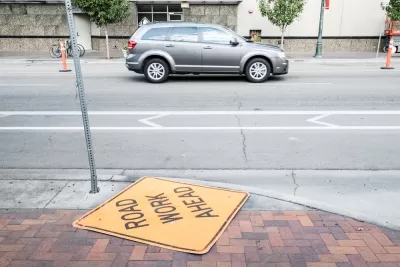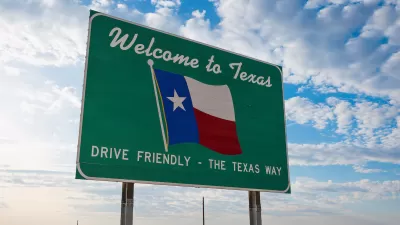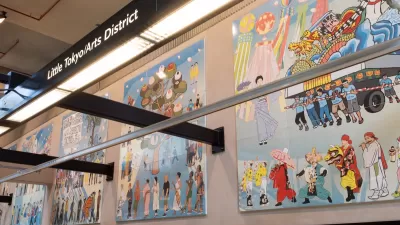Idaho state law prevents local voters from implementing the sales taxes that generate revenue to match federal funding for transportation projects, taking local and regional projects out of the running for many federal grant programs.

Kevin Fixler reports on a dilemma facing transportation planners in Idaho as Congress considers the Infrastructure Investment and Jobs act.
If the funding package passes and becomes law, it would guarantee Idaho billions of dollars over the next five years toward roads, bridges and other major infrastructure projects. Tens of millions of dollars for expansions of the state’s broadband internet and electric vehicle charging networks are also part of the hefty package, as is almost $200 million toward public transit improvements, according to a White House fact sheet.
Fixler notes that the earmarking process has already aquired funding for a host of projects around the state, including the Treasure Valley improvement project, which "imagines installing passenger shelters and bus pullouts, as well as real-time electronic route information at stops, to help build upon Valley Regional Transit’s ridership."
However, another list of projects that could potentially be funded by the federal infrastructure bill is off the table, due to a state law that prohibits local voters from implementing local sales taxes to to fund services, including transportation.
Matt Stoll, executive director of COMPASS, the region’s transportation planning agency, said this factor is the primary reason why expansions of the Treasure Valley’s public transit network remain stuck in neutral. The statewide shortcoming also prevents agencies such as VRT from applying for grants and other competitive pots of federal money to support the system, because the agency does not have the matching funds — from 20% up to 50% of the award — it needs to qualify.
The article includes more details on the state of transportation funding in a state that grew by 17 percent in the past decade, according to 2020 Census data.
FULL STORY: Idaho law limits how infrastructure bill can aid transit, leaves future riders waiting

Planetizen Federal Action Tracker
A weekly monitor of how Trump’s orders and actions are impacting planners and planning in America.

Chicago’s Ghost Rails
Just beneath the surface of the modern city lie the remnants of its expansive early 20th-century streetcar system.

San Antonio and Austin are Fusing Into one Massive Megaregion
The region spanning the two central Texas cities is growing fast, posing challenges for local infrastructure and water supplies.

Since Zion's Shuttles Went Electric “The Smog is Gone”
Visitors to Zion National Park can enjoy the canyon via the nation’s first fully electric park shuttle system.

Trump Distributing DOT Safety Funds at 1/10 Rate of Biden
Funds for Safe Streets and other transportation safety and equity programs are being held up by administrative reviews and conflicts with the Trump administration’s priorities.

German Cities Subsidize Taxis for Women Amid Wave of Violence
Free or low-cost taxi rides can help women navigate cities more safely, but critics say the programs don't address the root causes of violence against women.
Urban Design for Planners 1: Software Tools
This six-course series explores essential urban design concepts using open source software and equips planners with the tools they need to participate fully in the urban design process.
Planning for Universal Design
Learn the tools for implementing Universal Design in planning regulations.
planning NEXT
Appalachian Highlands Housing Partners
Mpact (founded as Rail~Volution)
City of Camden Redevelopment Agency
City of Astoria
City of Portland
City of Laramie





























